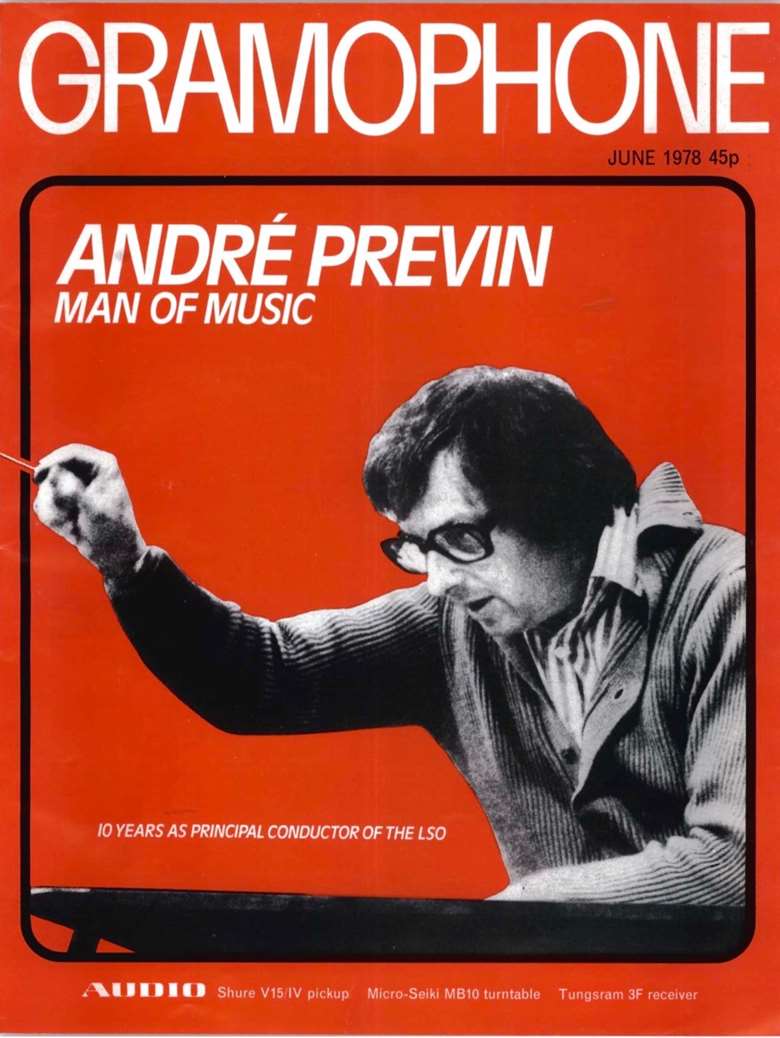André Previn has died at the age of 89
Thursday, February 28, 2019
One of the most ‘complete’ musicians of our time – composer, conductor, pianist, jazz musician – has died at the age of 89. The recipient of Gramophone’s Lifetime Achievement Award in 2008, Previn’s contribution to music was immense.

Here, reprinted from the March 2017 issue of Gramophone, David Gutman pays tribute to the German-born American polymath whose career has embraced the lowbrow, the highbrow and everything in between
Nonchalant collegiality has cloaked André Previn’s incredible breadth of talent. ‘Pierre Monteux used to say to me that it is very simple, in a position of authority, to make an orchestra play,’ said Previn, recalling his mentor’s advice, ‘but much harder to make them want to play. I have never forgotten that.’ Still, the case for the prosecution is easily made. Previn as cultural communicator has been no revolutionary. Nor was he a podium wizard like Carlos Kleiber, his own, inelegant stick technique applied to an infinitely wider if essentially peripheral repertoire. Or so it was said. He was a dazzlingly quick learner whose musical approach – never histrionic, aware (surely) that what is left unsaid often touches us the most – could be traduced as glossy or half-hearted. Rejecting specialisation can mean spreading oneself too thin, though few now question the acclaim accorded to Leonard Bernstein. Snubbing both modernism and period practice proved unfashionable too. And for this self-deprecating showman, prolonging a silence at the end of a work or milking applause has always been anathema.
Previn’s British celebrity derives partly from his years as a primetime TV personality. André Previn’s Music Night and his other undemanding BBC programme strands look positively Reithian alongside today’s reality TV. The conductor and his beloved LSO famously secured their place in light entertainment history on the Morecambe and Wise Show in 1971; and in the 1972 Christmas special he appeared appropriately attired as a ‘conductor’ on a Routemaster bus. We no longer have bus conductors – but whatever happened to family-friendly terrestrial TV coverage of Western art music?
Despite diminished mobility and occasional grouchiness, Previn kept going. What proved his final LSO appearance in June 2015 included an imperfect account of Rachmaninov’s Second Symphony, music he made a repertoire staple. He began, though, with a gag: laboriously installed on the rostrum in his special chair, the frail veteran swivelled round, announcing succinctly, ‘He’s up!’
With a legacy so diverse, even the most ardent fan is unlikely to encounter more than a taster. A nimble classical pianist with a pearly, slightly shallow tone once associated with the West Coast jazz scene, Previn retained his facility into old age. His film music career is usually discussed in terms of Oscar-winning musicals, though his admiration for Britten and Walton (later reciprocated) is more obvious in original scores for serious dramas like Bad Day at Black Rock (1955) and Elmer Gantry (1960). Later, the Tom Stoppard collaboration Every Good Boy Deserves Favour (RCA, 7/78), a ‘play for actors and orchestra’ first performed in 1977, called for pastiche Shostakovich. Previn’s soft-focus eclecticism is best transmuted in the set-piece arias of the opera A Streetcar Named Desire (DG, 4/99).
‘Classical’ conducting was the core activity for half a century. Less familiar scores were easily read, and late Romantics and conservative moderns suited best of all. As with Eugene Ormandy, his commercial background made him a superb accompanist. Recording partners have included Vladimir Ashkenazy, Dame Janet Baker, Barbara Bonney, Kyung Wha Chung, Jean-Philippe Collard, Renée Fleming, Radu Lupu, Itzhak Perlman, Gil Shaham and Anne-Sophie Mutter, who was briefly his (fifth) wife. Many of their collaborations remain on recommended lists.
Revisit Previn’s early studio groundbreakers and they’re seldom quite as you remember. The LSO Shostakovich Fifth (RCA, 5/66) is uncomplicated, yet the slow movement strikes astonishingly deep – where did that spaciousness come from? The rhythmic vitality coursing through Walton’s First (RCA, 1/67) may be rooted in jazz, though let’s not ignore the contribution of the self-consciously brilliant, (then) all-male ensemble that would shortly offer him the top job. I was lucky to hear this celebrated realisation live at an impressionable age! Elsewhere a certain throwaway casualness can frustrate. Previn’s Korngold Symphony (DG, 8/97) has not only unequalled gravitas but also uncorrected glitches. Still, there are unimpeachable classics, like the second of his three recordings of Rachmaninov’s Symphony No 2 (HMV, 4/73). Plentiful outings merit similar acclaim, from Françaix’s L’horloge de flore (RCA, 11/67) to Tippett’s A Child of Our Time (RPO, 1/87). While touring his humane and joyful Turangalîla-symphonie (HMV, 6/78), Previn faced walkouts from conservative audiences new to Messiaen. He introduced Shostakovich’s Thirteenth to London in 1971 and gave the Eighth a sensational Austrian premiere in 1973. Another important crusade was on behalf of Harold Shapero and his Symphony for Classical Orchestra (New World, 3/96). He gave the unheralded British premiere of John Harbison’s Third Symphony as recently as 2012. Completed in the early 1970s, Previn’s instantly iconic Vaughan Williams cycle features a wonderful, boisterous London Symphony (RCA, 8/72) and a Pastoral Symphony (9/72) so refined it’s as if Monteux himself were at the helm. In the Fifth, Previn would later elide all four movements as if in a single breath. He was always moved to tears by the Passacaglia’s miraculous final bars. Does that make his conception sentimental? I don’t think so.
Born Andreas Ludwig Priwin on April 6, 1929; died February 28, 2019











